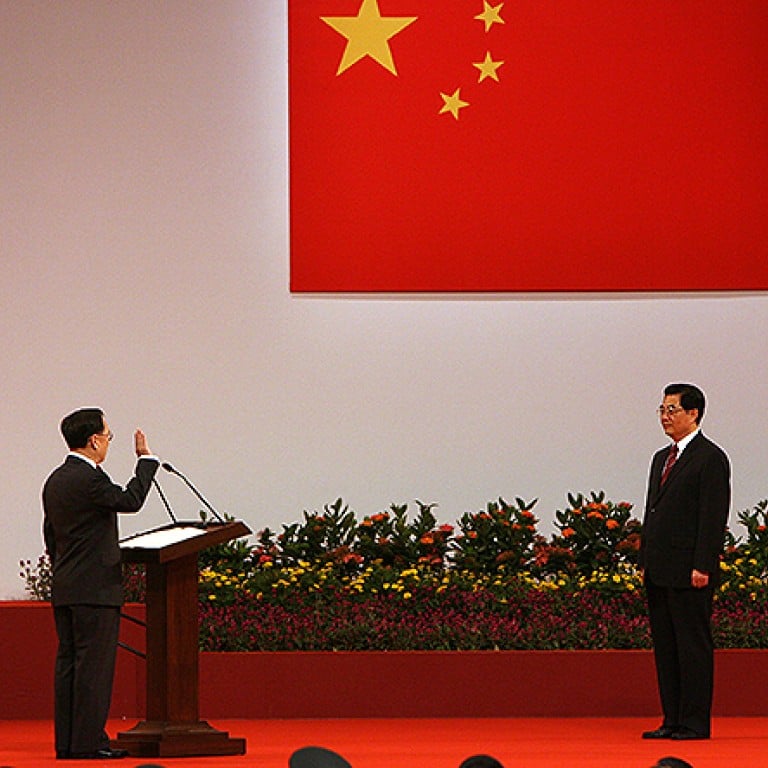
Democracy in Hong Kong was never Britain's concern, pre and post 1997
Kerry Brown says its priority was always a dignified retreat, given the limited room for manoeuvre
The consultations on constitutional reform in Hong Kong mark a moment of major decision-making in the special administrative region. The outcomes are still very unclear, but one thing is certain: Beijing's appetite for hearing British government wisdom on this issue is weak to non-existent.
This was made clear in the response to British minister Hugo Swire's piece in these pages last September. "There is no perfect model anywhere in the world," Swire wrote, "but the important thing is that the people of Hong Kong have a genuine choice to enable them to feel they have a real stake in the outcome."
The storm this created underlined the fact that while its ability to directly influence events in the city wanes by the day, Britain still has the ability to irritate Beijing when it speaks out on these issues.
Perhaps this is because Swire's comments are pervaded by the sense that not only does the British government have a right to an opinion about what happens in Hong Kong, but this right is somehow stronger and more legitimate than that of other stakeholders.
It is true that Britain obligated itself under the arrangements for the return of Hong Kong to Chinese sovereignty in 1997 to issue biannual reports for Parliament. But these have largely been low-key exercises, with hardly any public impact now.
Perhaps the time is right, therefore, to assess more precisely what the UK feels it did achieve in the years of negotiation prior to 1997, and see if that can give it any basis on which to lecture Hong Kong.
In an age in which the high art of diplomacy is being eroded by new forms of political interaction, and in which the Snowden revelations have laid bare the underwhelming technical detail of most diplomatic functions these days, the negotiations by a generation of Sinologists at the Foreign Office in London and Hong Kong are taken as some sort of golden age.
Around the formidable figure of Sir Percy Cradock, a group of young diplomats remained intimately embroiled in the whole saga of Hong Kong's return, from the uncomfortable moment in 1979 when Hong Kong governor Murray MacLehose first raised with Deng Xiaoping the possibility of extending the leases on parts of the territory and was unceremoniously rebuffed, to the culmination of imperial retreat on a rainy night in 1997.
This generation acted and spoke like they had achieved something significant. They were able to secure flourishing diplomatic careers on their battles over the Basic Law and the various challenges on the road to 1997. On the whole, the achievement of 1997 was regarded as a good one.
In hindsight, one wonders whether this attitude wasn't misplaced. As commentator Gerry Segal pointed out at the time, the outcomes for the management of the Hong Kong issue were pretty clear, and the British space for manoeuvre utterly limited. The negotiations themselves, if we ever see the full papers recording them, will no doubt appear more like bureaucratic theatre than real diplomacy.
The Chinese had the upper hand from the start, and the clearest vision of the outcome. It was never in their interests to jeopardise the territory's stability, despite patronising lectures from representatives of the British establishment trying to face them down.
The only figures who truly asked testing questions in the end were the politicians - Margaret Thatcher, and finally Chris Patten. The Patten reforms attempted to throw some resistant grit into the smooth machinery of appeasement that the "Sinologists" were busily constructing.
The preoccupation of the British diplomats specialising in China at that time, it seems in hindsight, was akin to most others of their generation. They wanted a smooth transition, with a nice final party, wholly in accord with the elegant management of national decline being enacted elsewhere in the world.
This was the real achievement of 1997 - a moment when Britain could pretend it mattered in a space where largely it didn't. To accord this some momentous achievement is misplaced. It was housekeeping, tidying up, retreating with dignity and order. But it was not some grand battle to construct a vibrant seed for democracy and reform in Hong Kong. That was never on the minds of the "Sinologists".
This is not to say that those who believe in the values of democracy, of an uncensored press, of the efficient delivery of justice and rule of law, shouldn't do all they can to support reform in Hong Kong - or anywhere else for that matter. But the history of Britain in the territory was, to put it politely, too complicated to be presented as some kind of inspiration for where Hong Kong needs to go in the future.
The simple and brute fact is that Britain's role, like that of the whole generation of Sinologists in the UK who took part in it, belongs to the past.

